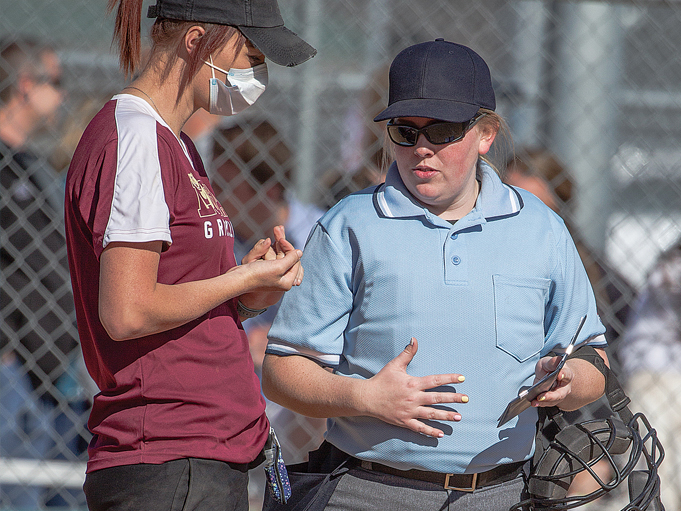Successful officials are approachable and are good listeners. They recognize they have two ears and one mouth and they use them in that proportion. Coaches are turned off by officials who appear unapproachable or standoffish.
Officials who are perceived by a coach as being unapproachable probably are unapproachable. And since perception is reality, whether the perception is in fact accurate is not important. Coaches will believe what they want to believe, and if they believe you are a poor official, for whatever reason, you are a poor official at least in that coach’s eyes. On the other hand, if a coach feels you are a good official, you will often get the benefit of the doubt, even if there are disagreements with some of your calls.
We don’t often think about the coach’s job. During a game, coaches not only have to manage the players on the field or court, but have to think about strategy, substitutions, reacting to what the opponent is doing, etc. So they are not always 100 percent certain what an official has called.
So a shouted, “What was that call?” may not be a complaint, it may be an actual question. Until the coach shows otherwise, we should assume coaches just want us to communicate with them.
When a coach initiates a conversation, let him or her talk and don’t interrupt. Have the courtesy to listen before you say anything. You may have made up your mind and there’s no way you’re changing anything, but by fully listening to what the coach has to say, you can at least empathize with the coach’s viewpoint.
When it is your turn to talk, repeating what the coach said indicates you heard him or her and you understood the message. It also gives the coach a moment to calm down.
There are situations when you won’t get a chance to talk because the coach will be screaming non-stop. Expect a loud harangue, displeased body language and negative vocalizing that communicate harsh disagreement. In those cases, you should decide what amount and type of grief you’ll accept and where and how to draw the line. Whether or not you penalize the coach, don’t let that harassment affect your next call. If you handle controversy successfully, it will be a mark of genuine presence.
When someone shouts at you, the natural inclination is to holler back. Understand you are not obligated to deliver a reply. It takes a firm resolve to pause deliberately and let the attack sink in.
If the gruff outburst is a general one, such as, “How can that be a foul?” or, “That’s terrible,” you may wish to ignore it. People aren’t always going to accept your decisions amicably. At times, though, given the nature of the call, a look in the direction of the angry person will acknowledge that you’ve heard the objection and you feel no response is necessary.
If the complaint is presented in a more measured tone, particularly in the form of a question, such as, “Can you please explain that call to me?” an answer is appropriate and deserved.
Depending on the coach’s remark, here are some possible responses:
- “How can I help you, coach? ”
- “Coach, would you care to know what I thought?“
- “Right after this play, can I talk to you then?”
- “We’ll (the officiating crew) talk about it and make sure we got it right.”
- “You may be right. Let me keep an eye on it.”
- “I didn’t get a look at it, but I’ll ask the official who called it to explain to me and I’ll get back to you.”
Coaches in those circumstances may still be unhappy with the call, but at least they will know their concerns are being heard. Inviting questions indicates your willingness to obtain feedback. Sometimes it helps you build in a time buffer — a couple plays or so — to let things settle down before you address the situation.
If constant chirping about your judgment occurs, take a private inventory of your decisions instead of slipping into the natural feeling of defensiveness. Are you missing low pitches? Are people reacting to fouls you aren’t seeing? Did you not see a late hit out of bounds? Maybe a valid message is being delivered and you’re not receptive. That doesn’t mean you must always question your own judgment when someone else does. Rather, avoid rationalizing and make a candid assessment.
Validate the coach’s comments by showing you are listening. A suggested response is, “Coach, if it happened the way you say it did, I missed it.” That won’t work multiple times, however. If you’re missing too much, it’s time to examine your mechanics and positioning.
Coaches shouldn’t be allowed to bring up calls from other games or earlier points in the current game. Limit discussion only to the most recent call. Make it clear you’re only willing to consider the current conflict; the past is history.
Certainly there will be times when a coach genuinely wants to argue, complain, vent or otherwise blow a gasket. How we react to those situations will vary. But before we can come to any decision, we have to listen. Without listening, we can’t understand what is being communicated to us.
What's Your Call? Leave a Comment:
Note: This article is archival in nature. Rules, interpretations, mechanics, philosophies and other information may or may not be correct for the current year.
This article is the copyright of ©Referee Enterprises, Inc., and may not be republished in whole or in part online, in print or in any capacity without expressed written permission from Referee. The article is made available for educational use by individuals.














